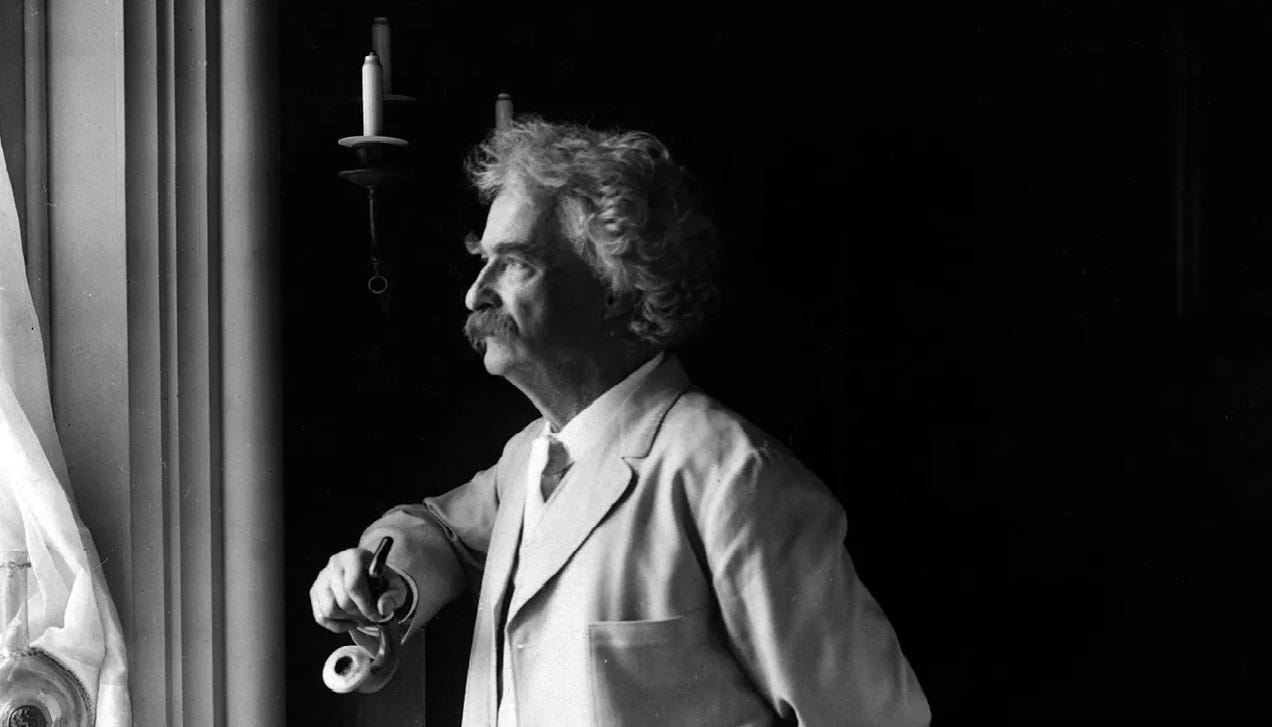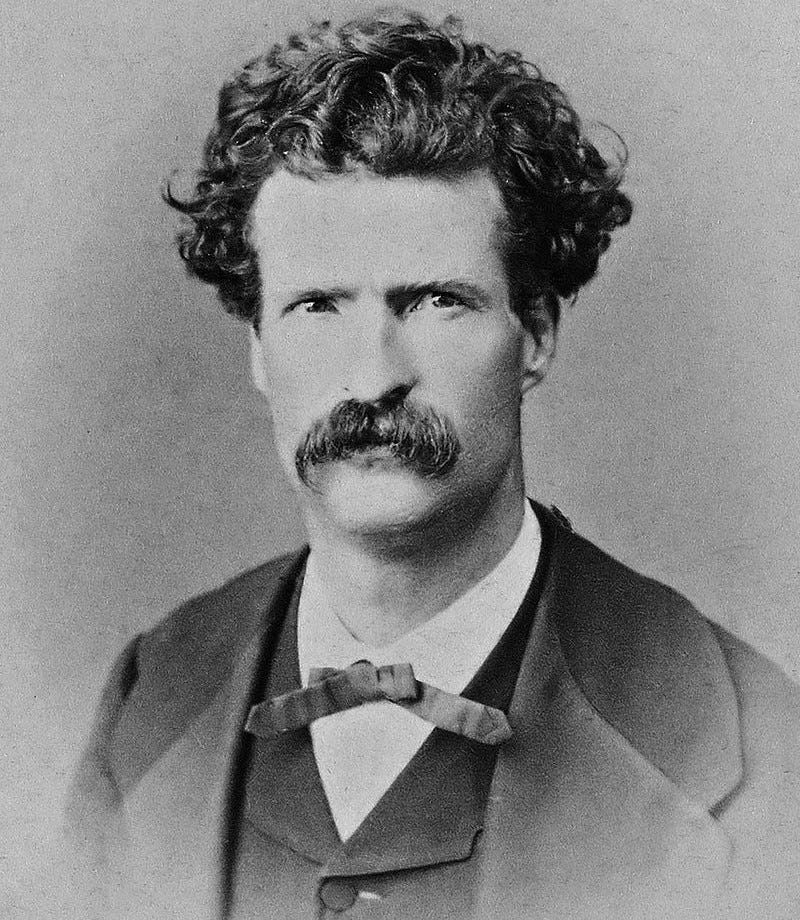About the time when Samuel Langhorne Clemens became Mark Twain
'Quintus Hopper of Nevada' series: Before he rose to fame as a writer and lecturer, he tried out a number of things. When prospecting didn't work out, he became a journalist - a time of tall tales!
Quintus Hopper of Nevada, published in January 2022, is a historical novel that follows the epic and peculiar life of a frontier newspaper typesetter. As part of my research I made extensive use of newspaper archives and, in this series, I’ll share some of my often surprising findings. Here are history, commentaries and contemporary newspaper articles as they relate to my latest novel. This time a look at Mark Twain in Virginia City, his infamous ‘Bloody Massacre’ hoax - and his hasty departure to San Francisco when life in Carson Valley seemed to suggest death by duel.
Before Mark Twain was Mark Twain, he was Samuel Langhorne Clemens. His storied life can be read up on in many of his autobiographical works. As for his time in Nevada, Mark Twain’s Roughing It offers a great account of his life as a prospector – and then as a reporter for the Territorial Enterprise. In the novel, Mark Twain and Quintus maintain a lifelong friendship – one that begins in Virginia City, where Quintus saves his friend’s life from one of the city fires, and where he eventually helps Sam Clemens to move on and become Mark Twain.
It was at the Enterprise that Mark Twain gained the skills that would make him a household name around the world. At the paper, he met the discipline of Joseph Goodman (his boss), and the tutorship and wit of Dan De Quille, both a reporter and a friend. They reported the news, but they also made the news. When there was a dearth of stories, they joyously made up hoaxes – and the Enterprise published them in the knowledge that those inventive stories would do one thing above all else – increase readership. Below is the infamous article, published in the Territorial Enterprise. It was pure fiction, written by Mark Twain with gusto and blood-curdling detail – and so of course it was picked up and reprinted by many other newspapers. They cried foul when they discovered that they had been had by Mark Twain.
October 28, 1863
Territorial Enterprise, Virginia City
A BLOODY MASSACRE NEAR CARSON
From Abram Curry, who arrived here yesterday afternoon from Carson, we have learned the following particulars concerning a bloody massacre which was committed in Ormsby county night before last. It seems that during the past six months a man named P. Hopkins, or Philip Hopkins, has been residing with his family in the old log house just at the edge of the great pine forest which lies between Empire City and Dutch Nick's. The family consisted of nine children - five girls and four boys - the oldest of the group, Mary, being nineteen years old, and the youngest. Tommy, about a year and a half. Twice in the past two months Mrs. Hopkins, while visiting in Carson, expressed fears concerning the sanity of her husband, remarking that of late he had been subject to fits of violence, and that during the prevalence of one of these he had threatened to take her life. It was Mrs. Hopkins' misfortune to be given to exaggeration, however, and but little attention was paid to what she said. About ten o'clock on Monday evening Hopkins dashed into Carson on horseback, with his throat cut from ear to ear, and bearing in his hand a reeking scalp from which the warm, smoking blood was still dripping, and fell in a dying condition in front of the Magnolia saloon. Hopkins expired in the course of five minutes, without speaking. The long red hair of the scalp he bore marked it as that of Mrs. Hopkins. A number of citizens, headed by Sheriff Gasherie, mounted at once and rode down to Hopkins' house, where a ghastly scene met their gaze. The scalpless corpse of Mrs. Hopkins lay across the threshold, with her head split open and her right hand almost severed from the wrist. Near her lay the ax with which the murderous deed had been committed. In one of the bedrooms six of the children were found, one in bed and the others scattered about the floor. They were all dead. Their brains had evidently been dashed out with a club, and every mark about them seemed to have been made with a blunt instrument. The children must have struggled hard for their lives, as articles of clothing and broken furniture were strewn about the room in the utmost confusion. Julia and Emma, aged respectively fourteen and seventeen, were found in the kitchen, bruised and insensible, but it is thought their recovery is possible. The eldest girl, Mary, must have taken refuge, in her terror, in the garret, as her body was found there, frightfully mutilated, and the knife with which her wounds had been inflicted still sticking in her side. The two girls, Julia and Emma, who had recovered sufficiently to be able to talk yesterday morning, state that their father knocked them down with a billet of wood and stamped on them. They think they were the first attacked. They further state that Hopkins had shown evidence of derangement all day, but had exhibited no violence. He flew into a passion and attempted to murder them because they advised him to go to bed and compose his mind. Curry says Hopkins was about forty-two years of age, and a native of Western Pennsylvania; he was always affable and polite, and until very recently we had never heard of his ill-treating his family. He had been a heavy owner in the best mines of Virginia and Gold Hill, but when the San Francisco papers exposed the game of cooking dividends in order to bolster up our stocks he grew afraid and sold out, and invested to an immense amount in the Spring Valley Water Company of San Francisco. He was advised to do this by a relative of his, one of the editors of the San Francisco Bulletin, who had suffered pecuniarily by the dividend-cooking system as applied to the Daney Mining Company recently. Hopkins had not long ceased to own in the various claims on the Comstock lead, however, when several dividends were cooked on his newly acquired property, their water totally dried up, and Spring Valley stock went down to nothing. It is presumed that this misfortune drove him mad and resulted in his killing himself and the greater portion of his family. The newspapers of San Francisco permitted this water company to go on borrowing money and cooking dividends, under cover of which cunning financiers crept out of the tottering concern, leaving the crash to come upon poor and unsuspecting stockholders, without offering to expose the villainy at work. We hope the fearful massacre detailed above may prove the saddest result of their silence.
It would be another story that eventually impressed on Mark Twain that it might be high time to leave Virginia City for California’s greener pastures. In May of 1864, the prominent ladies of Carson City had organized a ball to raise money for the Sanitary Fund. Mark Twain wrote about it, apparently in a drunken stupor – and in his text suggested jokingly that the raised funds might be misappropriated. Even though both De Quille and Twain read the article and said that it should definitely not be printed, it was left with the articles that were to be set to type and published with the next day’s edition. The publication of that article caused more than a little stir: The ladies demanded an apology, and their husbands demanded to duel the lying reporter. Again, it had been written in jest, but even De Quille and Twain had realized that it was too much jest. Other papers jumped on the opportunity to attack Mark Twain, the man who had outdone them time and time again. As a consequence, and to avoid dueling, Mark Twain hurriedly took a stagecoach to San Francisco.
Below article about the case and Mark Twain’s departure, published by one of the Enterprise’s rivals, the Gold Hill News, gives a great sense of the verbal jousting employed by feuding papers.
May 30, 1864
Gold Hill Daily News, Gold Hill
AN EXILE.
Among the few immortal names of the departed – that is, those who departed yesterday morning per California stage – we notice that of Mark Twain. We don’t wonder. Mark Twain’s beard is full of dirt, and his face is black before the people of Washoe. Giving way to the idiosyncratic eccentricities of an erratic mind, Mark has indulged in the game of infernal – in short, “played hell.” Shifting the locale of his tales of fiction from the Forest of Dutch Nick’s to Carson City; the dramatis personae thereof from the Hopkins family to the fair Ladies of the Ladies’ Fair; and the plot thereof from murder to miscegenation – he slopped. The indignation aroused by his enormities has been too crushing to be borne by living man, though sheathed with the brass and triple cheek of Mark Twain.
“Thrice the brinded cat hath mewed,
Thrice, and once the hedge-pig whined.”
Thrice the card of the indignant ladies has appeared in the columns of the Union, and once the Carson Independent contains the following:
LADIES’ SANITARY SOCIETY. – The ladies interested in the Sanitary Commission met in the parlor of the Ormsby House on Thursday evening last, for the purpose of ascertaining the amount of funds derived from all sources in aid of the Sanitary Fund. After deducting all expenses, it was found they had just $2,000, which was forwarded to Dr. Bellows, President of the National Sanitary Commission, yesterday. A vote of thanks was tendered to His Excellency Governor Nye, for his able lecture delivered in aid of the Fund, and to the Independent office for many favors in the way of printing; also to the officers of the society, and ladies who have assisted in the undertaking. The ladies all seemed highly pleased with their efforts, and we are informed that before adjourning they gave three cheers for the immortal four, and three groans for the Territorial Enterprise.
Those groans were not for the Enterprise in the abstract, but for the Enterprise as the vehicle of Mark Twain’s abominations. He has vamoosed, cut stick, absquatulated; and among the pine forests of the Sierras, or amid the purlieus of the city of earthquakes, he will tarry awhile, and the office of the Enterprise will become purified, and by the united efforts of Goodman and Dan de Quille once more merit the sweet smiles of the ladies of Carson.





